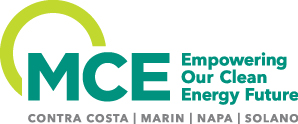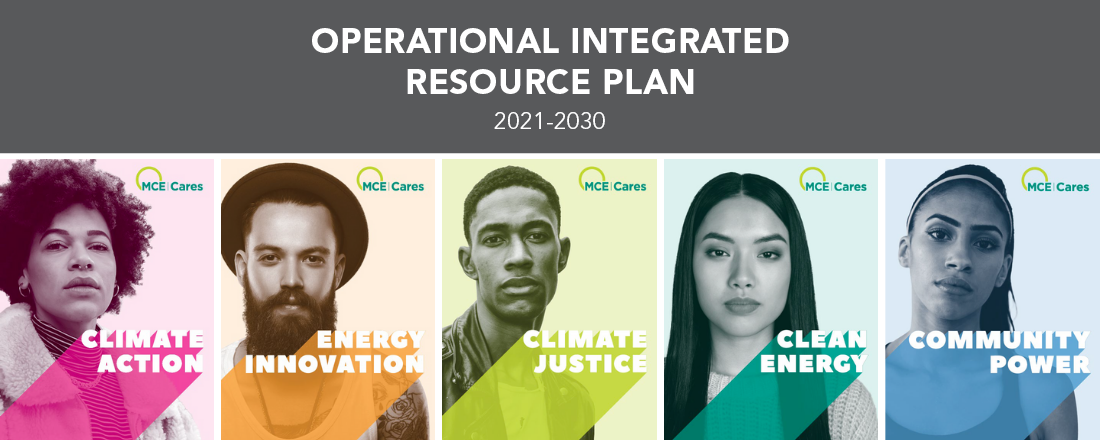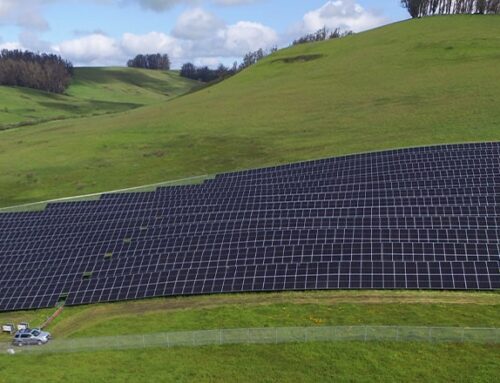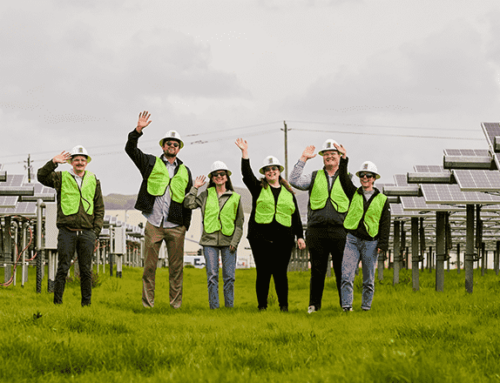MCE is meeting state renewable energy and climate goals light-years ahead of schedule, ensuring grid reliability and resiliency, boosting the green economy, and offering programs that benefit underserved communities. Every year we update our Operational Integrated Resource Plan, using it as a 10-year roadmap to help MCE set the standard for reducing energy-related greenhouse gas emissions in California. Below are some highlights from MCE’s 2022 plan (pdf).
Building Clean Energy
MCE’s Light Green energy service is expected to be 95% greenhouse gas free by 2023 and 85% renewable by 2029. Renewable resources are naturally replenishing resources with low or no emissions associated with the generation of power such as solar, wind, and biomass. Greenhouse gas free resources include renewable power and also resources that are not naturally replenishing but do not produce emissions when generating power including large hydroelectric and nuclear. MCE’s energy portfolio includes the development of 810 megawatts of new California renewable energy projects. Since 2010, MCE has reinvested over $68 million in local renewable energy projects and helped develop 49 megawatts of new renewable projects in our service area.
MCE Local Reinvestment by Category
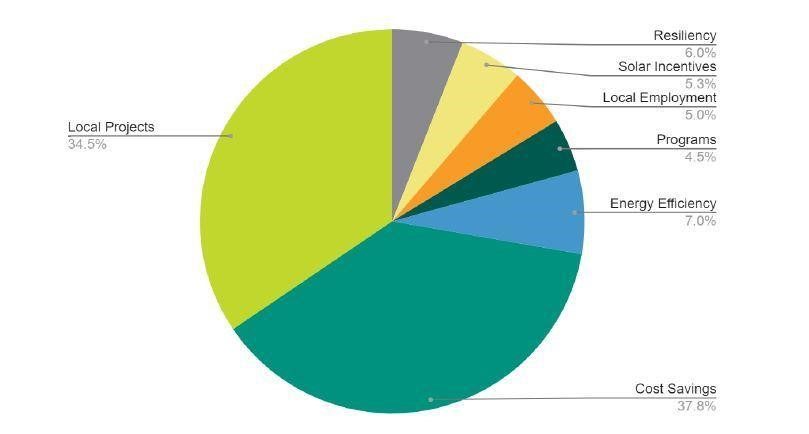
MCE’s Feed-in Tariff program incentivizes renewable development in MCE’s member communities by offering above-market-rate contract prices for up to 45 megawatts of new projects. These projects also have requirements for 50% local hire, livable-wage jobs to boost the green workforce economy, and newly built solar projects must include pollinator-friendly ground cover at the project site to promote sustainable building practices.
Reliability and Resiliency
MCE is committed to ensuring that our customers have a reliable source of power, a preparedness plan, and contingency measures in place in the case of a power outage. MCE is working with customers to ensure access to cleaner backup power resources, helping keep the lights on without fossil fuel resources that can worsen indoor air quality. To advance energy reliability and resiliency in our service area, MCE has focused on building distributed energy resources, such as batteries, smart thermostats, and electric vehicle charging equipment. MCE is also focused on creating demand response programs which reduce energy use and encourage energy use when clean energy is abundant.
MCE’s Demand FLEXmarket is a first-of-its-kind program aimed at shifting energy use in our service area away from times of extreme demand. The DemandFLEXmarket provides tools to measure hourly reductions in energy use that will allow MCE to compensate local businesses for energy savings during peak hours. The program will help minimize crises such as blackouts and help advance decarbonization and climate adaptation by integrating clean distributed energy resources.
To mitigate the impact of grid outages and PG&E Public Safety Power Shutoff events and to improve overall grid reliability, MCE’s Board of Directors approved a $6 million Resiliency Fund in 2019.
In 2020, MCE launched our Energy Storage Program to provide backup power during outages and reduce GHG emissions. This program prioritizes vulnerable customers and populations that are disproportionately affected by grid outages. As an extension of MCE’s Energy Storage Program, MCE is partnering with the National Energy Improvement Fund (NEIF) to provide low- and zero-interest loans to help Bay Area residents finance home energy storage systems. MCE is also working with the Marin Community Foundation to advance resilience in critical facilities operated by nonprofits throughout Marin County.
Equity
MCE is committed to providing tailored programs and services that address environmental justice issues in our service area. MCE collaborates with our Community Power Coalition to better address the concerns of underrepresented and historically marginalized communities through collaboration and open dialogue. MCE’s Community Power Coalition offers expert advice about the needs of constituents and how MCE can best support underserved customers and environmental equity through our programs, policies, and procurement. The coalition currently has 52 members.
Most recently, MCE has been collaborating with the California Public Utilities Commission, investor-owned utilities, and other CCAs to develop community solar programs for customers in disadvantaged communities (DACs). The Green Access and Community Solar Connection Programs offer 100% renewable power to customers located in DACs and a 20% bill discount. MCE estimates these programs will provide almost 2,900 customers with bill discounts and access to more renewable energy.
In response to the COVID-19 pandemic, MCE also launched the $10 million MCE Cares Credit Program offering qualifying customers bill relief in the form of a $10 monthly bill credit for residential customers and a 20% bill credit for small businesses.
Transportation Electrification
Since 2017, MCE has been working on several electric vehicle (EV) initiatives, including demand-response-enabled charging devices, equity-centered incentives for electric vehicles, and funding for charging stations. MCE’s EV rebate program for income-qualified customers has helped over 170 customers purchase or lease new Evs. MCE plans to expand the EV rebate program to include used Evs. Since 2018, MCE has supported or funded 1,176 Level 2 charging ports for workplaces and multifamily properties. More than 850 ports have been installed—equivalent to 56% of all public Level 2 charging ports in the four counties that MCE serves—and more than 320 ports under planning and construction. MCE plans to continue to support EV adoption and build EV infrastructure throughout our service area in the coming years.
Energy Efficiency
Energy efficiency lowers energy consumption, saves customers money, and reduces GHG pollution, all of which are core to MCE’s mission. MCE currently administers energy efficiency programs for multifamily, single family, commercial, agricultural, and industrial customers. MCE also offers our Low-Income Families and Tenants (LIFT) Program, which serves income-qualified, multifamily properties and includes a ‘fuel-switching’ component to incentivize property owners to replace gas-fired space and water heaters.
MCE invests in multiple workforce development initiatives to encourage the growth of green-collar jobs, particularly in the energy efficiency and electrification sectors. Most recently, MCE launched the Workforce, Education, and Training (WE&T) Program to create a geographically diverse pool of training partners who are able to provide job seekers with skills for success in the decarbonized energy future. MCE is in the process of developing a mentorship and internship program to help the existing contractor workforce upgrade their energy efficiency skill set and support green career pathways.
Over the next 10 years, MCE is committed to expanding the scope and impact of our customer programs and ensuring a reliable and affordable clean energy service. View the complete Operational Integrated Resource Plan to learn more about MCE’s commitment to our communities.
